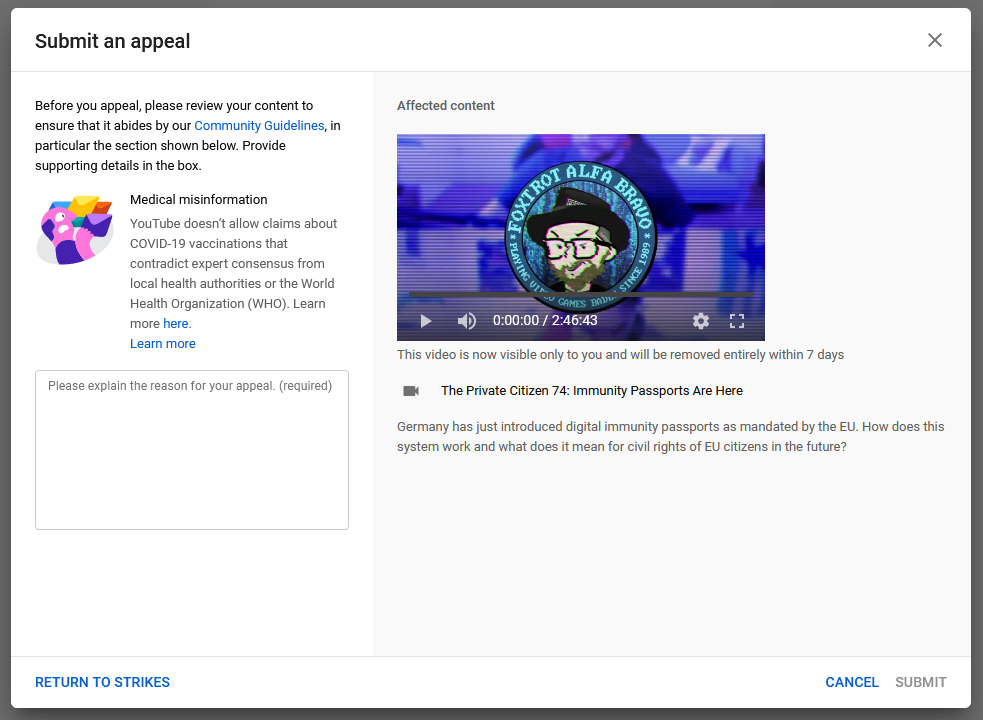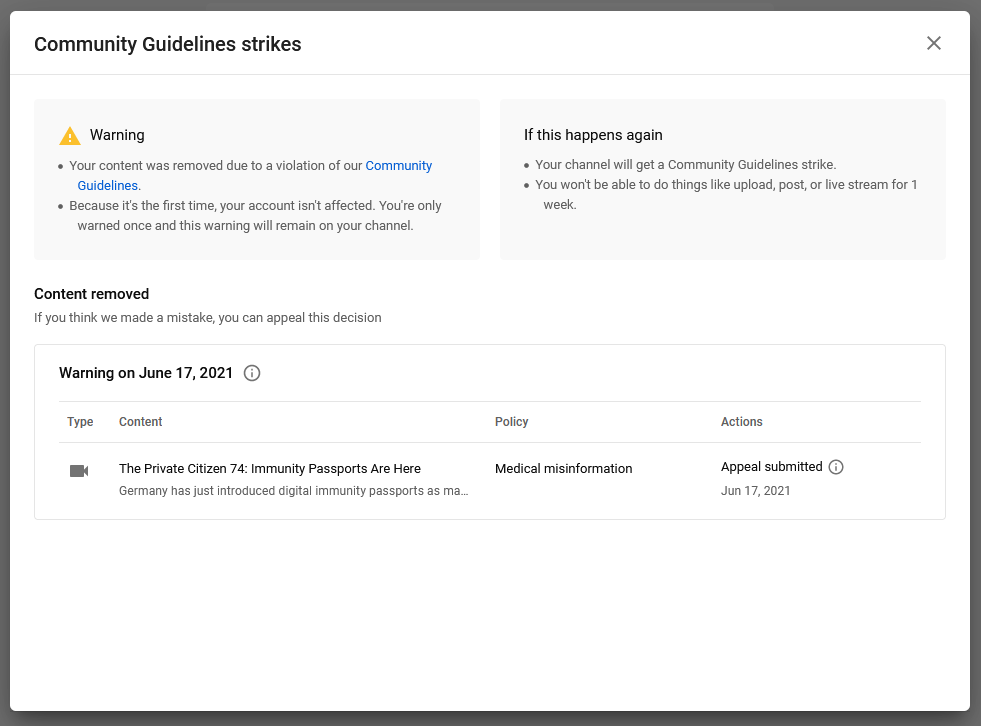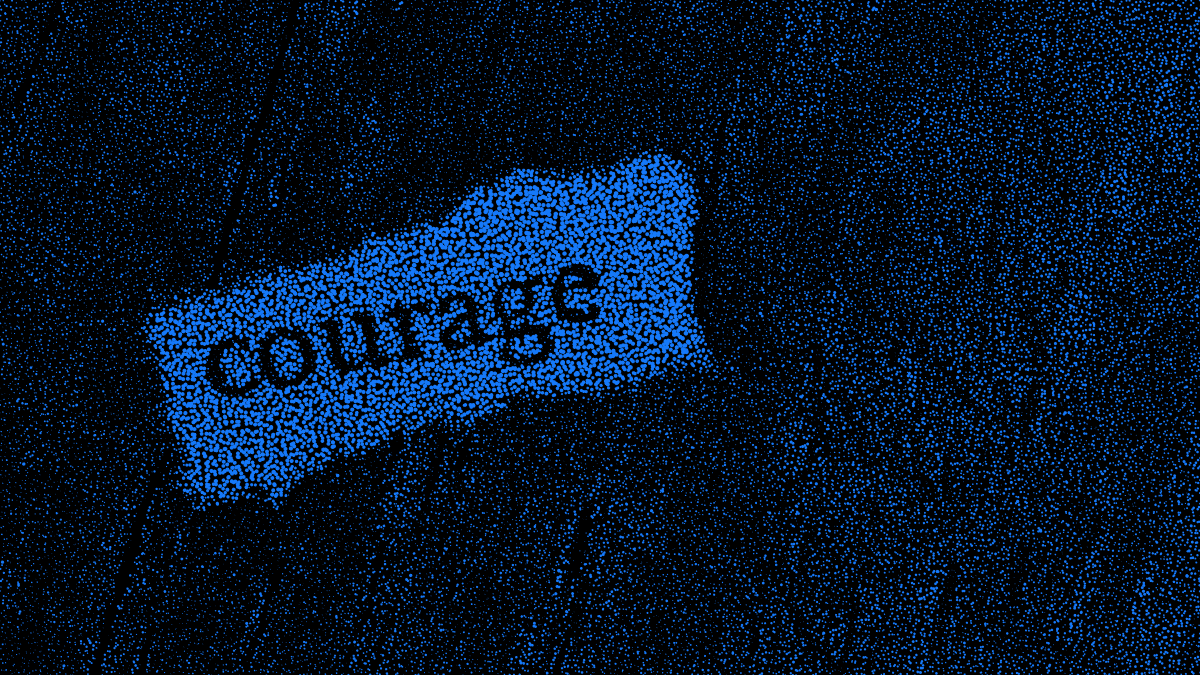YouTube blocked one of my episodes, insulting my professional reputation and claiming that I was spreading misinformation about SARS-CoV-2 vaccines. They later admitted they were wrong, but refuse to tell me how such an egregious mistake can happen. Let’s examine what behaviour like this means for freedom of speech and freedom of the press.
I called it and an episode later it happens: YouTube blocks one of my videos and shows why The Private Citizen is, first and foremost, a podcast – storing its content on its own servers and using censorship-resistant open technologies like the Web and RSS for distribution.
 This podcast was recorded with a live audience on my Twitch channel. Details on the time of future recordings can usually be found on my personal website. Recordings of these streams get saved to a YouTube playlist for easy watching on demand after the fact.
This podcast was recorded with a live audience on my Twitch channel. Details on the time of future recordings can usually be found on my personal website. Recordings of these streams get saved to a YouTube playlist for easy watching on demand after the fact.
YouTube Insulted My Work Ethics Based on Shitty Algorithms
As you probably know, I stream the recording sessions of this podcast live on Twitch. After they are concluded, I release the podcast on this website and then upload the recording of the Twitch video to my YouTube channel. A few hours after I had uploaded last week’s podcast episode to YouTube, I received a TOS strike against my account there. YouTube insinuated that I was spreading “claims about COVID-19 vaccinations that contradict expert consensus from local health authorities or the World Health Organization (WHO)".
Anybody who has listened to last week’s episode knows that this is plainly not true. I talked about my personal experiences with receiving the AstraZeneca vaccine, quoted straight from the official vaccine documentation I received from my doctor – which bore the logos of AstraZeneca, the Robert-Koch-Institut (RKI) and the Paul-Ehrlich-Institut (PEI) – and mentioned one or two peer-reviewed studies on PubMed. I also explained the technical details of the EU implementation of digital immunity passports, based directly on the EU’s own legal and technical documentation. None of this information contradicted anything published by the WHO or the RKI.


I am a journalist. I give my utmost to follow the legal and ethical guidelines set forth for my profession in my country and internationally. YouTube saying that I am spreading misinformation insinuates that I am either intentionally misleading people or that my research isn’t good – either way, I feel strongly insulted in my professional honour as a journalist. Therefore, I resolved to fight this scandalous claim by YouTube tooth and nail. I also resolved to not let it rest until I have a plausible explanation for what happened here that I can share with the public. Because that is my job, YouTube’s claim that I don’t do it well notwithstanding.
YouTube Admits They Were Wrong
First, I disputed YouTube’s claim using the system provided within YouTube Studio to creators. Next, I sent an email to Google’s press office explaining the situation and quoting my dispute message:
Dear ladies and gentlemen,
my name is Fabian Scherschel and I’m a freelance journalist from Germany. I have a history of almost a decade of professional journalistic work, covering mostly open source news, IT policy, infosec and privacy stories. Since February 2020, I’ve also been covering the SARS-CoV-2 pandemic, especially from a technical level concerning various COVID-19 apps and their privacy and security applications. I’ve been covering this and its societal impact, among other places, in my podcast The Private Citizen.
Episodes of this podcast are live recorded on Twitch and I export them to my YouTube channel. I’ve covered the SARS-CoV-2 pandemic, its impact and scientific research pertaining to this topic since March 2020 on this podcast in 30 episodes to date. 11 of these episodes are on YouTube. Yesterday, I received a community guideline strike against my channel for the latest episode of the podcast which I also uploaded to YouTube. Your complaint states:
Medical misinformation
YouTube doesn’t allow claims about COVID-19 vaccinations that contradict expert consensus from local health authorities or the World Health Organization (WHO).
This is not the case. I therefore disputed this claim as follows:
I have been covering the topic of SARS-CoV-2 and COVID-19 since February 2020 as a freelance journalist for a number of outlets. I am well versed in the topic and I am not aware of how this video is violating your guidelines. In fact, I think your blocking of this video might violate my rights as a member of the press in Germany. I would like you to explain to me, with concrete examples, where my video contradicts expert consensus from the RKI or WHO. I doubt very much that this is the case and will assume at this point that someone on your end made a mistake. I will contact the Google press office about this and reserve the right to use this case as part of my coverage as a freelance journalist in any story for any outlet I see fit.
As a member of the press it is my duty to report on topics that are important to the public. This undoubtedly includes the SARS-CoV-2 pandemic. I do so with care and a lot of work experience. I constantly do my utmost to abide by the German press codex in my work. As such, I research my stories well and use primary sources whenever possible. The idea that I am spreading “medical misinformation” with my work is, frankly, abhorrent to me. I will assume there was some kind of mistake here and that you will explain to me what happened – in as much technical detail as possible. Otherwise, I’m apt to consider this kind of unsupported claim against my work as a grave insult to my work ethics.
I am aware that you can conduct yourself on your platform as you see fit. But you are effectively silencing a member of the press based on unsupported claims. I also see nothing in my past work history or my history with your platform that would support such a measure. YouTube, in my eyes, isn’t simply a video platform of a private company anymore, but a social phenomenon that influences society at large to a significant degree. As such it should, at least in my eyes, hold itself to a higher standard than this. With such reach and influence comes responsibility as well.
Aside from being passionate about security and privacy, freedom of the press is a very important topic to me and as a veteran IT journalist I intend to cover this situation in my further work. Previous research of mine into YouTube bans of videos concerning the SARS-CoV-2 pandemic would suggest that there have been a number of occurrences of bans that, objectively examined, where not justified. I think amidst the current discussion of modern journalism, its shortcomings and the – for lack of a better term – culture wars raging with regards to this subject at the moment, this is a topic that warrants a closer look. And you have just increased my passion for this topic very much.
I am hereby extending you the opportunity to explain to me what happened and to explain your side of the story so that I may include it in my coverage. I would also like to notify you that I will bring this issue to the attention of my trade organisation, the Deutscher Journalisten-Verband (DJV), because I think this kind of treatment constitutes a significant threat to the ability of freelance journalists in Germany to do their work.
I await a swift response.
To date, I did not receive a reply to this email. However, about 24 hours after the ban, YouTube unbanned the video and sent me the following automated email:
We have reviewed your appeal for the following content:
Video: The Private Citizen 74: Immunity Passports Are Here
After taking another look, we can confirm that your content does not violate our Community Guidelines.
Thanks for your patience while we reviewed this appeal. Our goal is to make sure content doesn’t violate our Community Guidelines so that YouTube can be a safe place for all – and sometimes we make mistakes trying to get it right. We’re sorry for any frustration our mistake caused you, and we appreciate you letting us know.
So they clearly admit they were wrong, but refuse to give me any detail on what happened or how they will make sure that it won’t happen again. They also don’t even have the decency to write to me in person about this. I decided to give them one more chance and sent a follow-up email to their press office today:
Dear ladies and gentlemen,
I have received an automated message some time ago, admitting that you made a mistake blocking my video and that it has been reinstated. Unfortunately, this message includes no information on what went wrong and led you to assume (baselessly, in my opinion) that I was spreading misinformation.
As I have pointed out to you, I consider this kind of behaviour from your company a serious issue where press freedom is concerned here in Germany and I will cover it in some forthcoming articles. I have also started a dialogue with my trade union and fellow journalists to bring some attention to this issue.
This will be my last email to you in this matter and I urge you to start a dialogue to explain your side of the story here. If you do not answer, I will assume that you are not interested in resolving this kind of overblocking of legitimate content on your end.
I will let you know what they say, should they ever get back to me.
The Bigger Issue at Stake Here
Make no mistake, this isn’t about me or my video. I could not care less. There is a reason why I don’t rely on YouTube as a primary way of distributing my content. There is a reason why this is, first and foremost, a podcast. I mean, I had basically called this very situation one episode before. That episode was primarily about copyright-related blocks, but the core argument is the same: Platforms like YouTube are shitty places to rely on if you want freedom of information. It is, after all, a good time to be a podcaster.
What YouTube does there, is censorship. It isn’t censorship with respect to article 5 of the Grundgesetz  , which – even though it states “censorship does not exist” – is only concerned with censorship of the state towards its citizens. So it is not illegal censorship. It is censorship of a private company towards citizens – or in my case the press – based on its own terms of service.
, which – even though it states “censorship does not exist” – is only concerned with censorship of the state towards its citizens. So it is not illegal censorship. It is censorship of a private company towards citizens – or in my case the press – based on its own terms of service.
Companies love to base censorship on their terms of service because the only way to fight it is a civil lawsuit which an individual basically has no chance of winning on their own against a company like Google which has limitless war coffers and endless lawyers on retainer. The only chance I would have to fight this is to get legal support from my trade union or a press-freedom-oriented NGO.
Even in cases where social media companies are required by law to block content – a good example is the NetzDG law in Gemany – they will often do so based on their TOS instead of quoting that law. They do this because the NetzDG is a criminal law that will result in criminal cases and has clauses that allow affected content creators or users to counter sue if their work has been blocked – and they themselves thus have been libelled – by mistake. And criminal cases are much more of a level playing field when a single person is facing off against a huge corporation. The content creator or user is much more likely to win.
c.f.:
→ Das NetzDG in der praktischen Anwendung: Eine Teilevaluation des Netzwerkdurchsetzungsgesetzes  , Liesching et. al., 2021
, Liesching et. al., 2021
YouTube is a company and can, legally, do on their platform whatever they want. Including censoring random topics or random users they see fit. Where it becomes a grey area, in my opinion, is the fact that many journalists (including from established publishing companies) use YouTube to distribute important journalistic work – primarily because of its reach and the fact that the bandwidth is free. YouTube is therefore becoming an important medium and a factor in the everyday life of people. It’s becoming a factor that influences our society and democracies greatly. Therefore I think YouTube has a higher responsibility to society at large to do better.
There might also be an argument here in Germany – keeping in mind that article 5 of the Grundgesetz also guarantees press freedom – that such a platform has a special responsibility to not censor important journalistic works, its private status notwithstanding. There have been significant court decisions in Germany in the past that have made it clear that bloggers and YouTubers can be considered journalists if they are covering important topics in the interest of the public. And I think the coronavirus pandemic is undoubtedly such a topic.
Censoring people based on TOS clauses that these people have not broken is clearly wrong. But there is also the question if it should be allowed for a private company to censor the press in cases where the press is contradicting guidance from the WHO or RKI. After all, both those agencies have been wrong on numerous occasions when it comes to the pandemic and had to correct themselves later. Additionally, the RKI is a government agency and the calling of the press is obvious in this regard: To keep the government on their toes and contradict its agencies if they are wrong. We have learned painfully during the Nazi regime what happens if the press is forced to agree with the government.
Producer Feedback
Evgeny Kuznetsov delivers an in-depth boots-on-the-ground report from Moscow:
It’s official: Any public-serving business in Moscow (a restaurant, barbershop, grocery store, anything “open to the public at large”) is now required to have at least 60% of the employees vaccinated or face a fine of up to 1M Roubles (approx. 11.5k Euro). Also, the Moscow metro system (subway and city trains) officially refuses to hire anyone not vacced. Universities in Moscow are “seriously considering not letting non-vacced students in when the new semester starts on September, 1”, or so the mainstream press reports, allegedly trying to scare the students into getting vacced while there’s still time to get both shots.
It actually looks like Russian authorities are going extreme lengths to use the whole COVID thing as an excuse to send as many rights as possible down the drain. Remember how I mentioned a couple of days ago that public-serving businesses in Moscow are now required to have at least 60% of the staff vacced? In Russia there are some “required vaccines”; there are professions that you aren’t allowed to practice unless you’re vacced (for example, a restaurant cook is required to have TBC vaccinations, and a school teacher is required to have measles vaccinations, etc.); there’s a clause in the Labour Codex that allows an employer to send an employee home without paying any salary if the employee doesn’t have the “required vaccinations” (in the trades where those apply, obviously). There’s a list of which vaccines are required for which professions, maintained by the Ministry of Healthcare. SARS-CoV-2 is nowhere near that list. Well, now Moscow authorities say that the clause in the Labour Codex applies, and it’s OK for businesses to send people home without payment if they refuse to get vacced.
And the impacts kept coming and coming:
The Moscow Healthcare Department has now forbidden its hospitals to admit non-vacced patients except for emergencies, oncology, hematology, and patients who can’t get vacced due to medical reasons. Since MHD is basically the local Ministry of Healthcare and controls all the state-funded hospitals in Moscow (except those directly controlled by federal authorities), it means no scheduled surgeries and such for the non-vacced.
Boy, Moscow keeps on delivering non-stop. Just published officially by the Mayor, the latest insanity: Restaurants, bars and such are forbidden 23:00 till 06:00, only takeouts allowed, has been so for a couple of weeks already. Now starting today this ban is lifted, but only for those establishments that have all the staff vacced and have set up the software to verify the QR-codes of visitors' vaccination certificates (I mentioned earlier how we have the digital certificates in the Gosuslugi system). Only people with valid certificates are allowed inside, with the exception of – and I literally cried out loud as I read this – people under 18 accompanied by a parent or a legal guardian with a valid certificate! Every time I think I have a good idea of how far this fucking circus we call our government can go, they go beyond and amaze me again.
Just a little perspective: of course, nobody trusts any official Russian statistics anymore, but from what I gather chatting in the medical community, Russia and Moscow in particular are currently being hit rather hard with the “delta variant” (aka the Indian strain). To the point that Moscow reopened two whole COVID hospitals that it had already closed since last year. The medical university I work at has repurposed its multidisciplinary medical centre to be a specialized COVID clinic last summer, and volunteered a lot of professors, grad students and undergrads to work there; this week we increased the capacity of the centre by 300 beds due to excessive load. I mean, things look bad, they do. But all this legislation and all the new norms…
Later, Evgeny reported:
Moscow Mayor’s new order: Starting next Monday there’s no entering any food establishments (restaurants, cafes, bars, diners, anything) without presenting a QR-code that links to either a Gosuslugi record of a completed two-shot vaccination (Russia-wide), a PCR-test no more than 3 days old (Moscow-wide), or a medical record of having had CoViD-19 no more than 6 months ago (Moscow-wide). No exceptions this time. A doctor’s note won’t do, even if it should be recorded in the government electronic medical records system.
Privacy?! Meh! Democracy?! Meh! Moscow does have a parliament, but all these are Mayor’s executive orders, not even voted on. In Russia there’s a saying: “Every joke has some truth in it”, though these days it’s more like “every joke has some joke in it”. The saying I remember most often these days, however, is: “Russia doesn’t have citizens. She only has subjects.”
During the recording of the episode, superuser chimed in with some breaking news: Apparently John McAfee has been found dead in his jail cell  . I will keep an eye on this story.
. I will keep an eye on this story.
If you have any thoughts on the things discussed in this or previous episodes, please feel free to contact me. In addition to the information listed there, we also have an experimental Matrix room for feedback. Try it out if you have an account on a Matrix server. Any Matrix server will do.
Toss a Coin to Your Podcaster
I am a freelance journalist and writer, volunteering my free time because I love digging into stories and because I love podcasting. If you want to help keep The Private Citizen on the air, consider becoming one of my Patreon supporters.
You can also support the show by sending money to  via PayPal, if you prefer.
via PayPal, if you prefer.
This is entirely optional. This show operates under the value-for-value model, meaning I want you to give back only what you feel this show is worth to you. If that comes down to nothing, that’s OK with me. But if you help out, it’s more likely that I’ll be able to keep doing this indefinitely.
Thanks and Credits
I like to credit everyone who’s helped with any aspect of this production and thus became a part of the show. This is why I am thankful to the following people, who have supported this episode through Patreon and PayPal and thus keep this show on the air:
Georges, Steve Hoos, Butterbeans, Jonathan M. Hethey, Michael Mullan-Jensen, Dave, 1i11g, Vlad, Jackie Plage, Philip Klostermann, Jaroslav Lichtblau, Michael Small, ikn, Kai Siers, Fadi Mansour, Bennett Piater, Joe Poser, Dirk Dede, Larry Glock, tobias, David Potter, Matt Jelliman, Mika, Martin, m0dese7en, Sandman616, Dave Umrysh, MrAmish, avis, drivezero, RikyM, Barry Williams, Jonathan Edwards, Rizele, Rhodane the Insane, Captain Egghead, Cam, D, RJ Tracey, noreply, Rick Bragg, Iwan, Robert Forster and Superuser.
Many thanks to my Twitch subscribers: Mike_TheDane, Flash_Gordo, acherontas_vii, BaconThePork, brigadiersirnilsolav, indiegameiacs, Nommed771, m0dese7en_is_unavailable, Sandman616, redeemerf, ezequiel_017, centurioapertus and Galteran.
I am also thankful to Bytemark, who are providing the hosting for this episode’s audio file.
Podcast Music
The show’s theme song is Acoustic Routes by Raúl Cabezalí. It is licensed via Jamendo Music. Other music and some sound effects are licensed via Epidemic Sound. This episode’s ending song is Light Drinking by Dicty.

